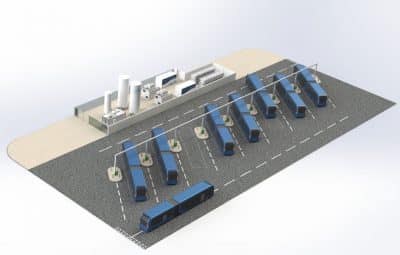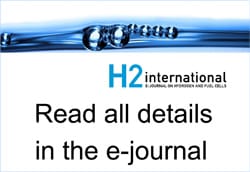If there was one thing that the Diesel Summit made abundantly clear, it was the lack of zero-emission, or even low-emission, cars on the German market. The 28 mayors who met with interim chancellor Angela Merkel in Berlin, Nov. 28, 2017, were faced with a dilemma. They would like to purchase electric buses and promote electric cabs, but there aren’t any on the market, at least in Germany.
Some made it seem as if the looming driving bans came as a total surprise that no one could have prepared for. But it has long been known that the air quality in big European cities is deteriorating while there is no viable low-emission car market to speak of (see March 2017 and July 2017 issue of H2-international). Several attendees renewed their criticism of the purpose of these Diesel Summits, stressing that those eleventh-hour attempts were too little too late.
The German government pledged to make EUR 1 billion available in federal and state aid to provide support in the short term, giving administrators at both governmental levels the option to combine those incentives for their programs. In response, the acting mayor of Berlin, Michael Müller, announced that the city would, in some cases, double its EUR 4,000 incentive for cab companies planning to switch from diesel to hybrid or electric vehicles. But he also heavily criticized German manufacturers for not offering a single electric cab. The situation wasn’t any different with the bus market. Still, Müller said that the city would follow Hamburg’s example and starting in 2020, would buy electric buses – if necessary, from manufacturers abroad.
Expressing her discontent, a spokeswoman for Berlin’s mass transit company told bizz-energy.com:
“You just don’t find any buses on the European market. We’d buy in bulk and hope that the industry realizes they’re missing out on a big moneymaker. Someday, we’ll need much more than a thousand.”
Manufacturers draw a blank
A few years back, German automakers certainly had the guts to push ahead on some promising ventures, not just in electric buses but especially in fuel cell vehicles. Take Daimler for example. As part of Cute and HyFleet:Cute, the corporation had 36 fuel cell Citaro buses running for 12 mass transit companies on three continents. Those Citaro FuelCell Hybrid versions were based on NeBus, a design that Daimler developed, with much government support, in parallel to the fuel cell-powered NeCar. MAN, too, had been working on hydrogen buses for years before it abandoned its activities in the sector altogether.
…
During the Busworld 2017 show, the head of Daimler’s bus division, Hartmut Schick, told eurotransport.de:
“There are still buses that need to be on the road for more than 350 kilometers [217 miles] a day and cannot be refueled anywhere during that time. It is those buses for which we’re contemplating a fuel cell solution in the form of a range extender. So, the focus has shifted, away from fuel cells as the only energy supply on board, as we had previously thought.”
…
Rhineland’s 30 fuel cell buses
It’s not as if there aren’t any efforts being made, but those projects will rely on vehicles manufactured abroad. For example, Cologne’s regional transportation provider RVK announced that 30 fuel cell buses will be driving in and around the city starting in 2019. After being told in late September last year that its funding application to the federal transportation ministry had been successful, it can expect to receive EUR 13 million to purchase fuel cell hybrid buses and to have two additional hydrogen stations, one in Meckenheim and the other in Wermelskirchen, installed by the end of 2018.
…
The council of the Rheinisch-Bergischer Kreis district has meanwhile agreed to cover the yearly O&M costs of all 15 buses. To the left of the Rhine, it is the Rhein-Sieg-Kreis and Rhein-Erft-Kreis districts where respectively 10 and 5 buses are said to go into operation, with the latter using them as part of the transportation network in Hürth and Brühl.
The Fuel Cell’s 8 in France
…
Jan Van Hool, the bus manufacturer’s director of design, said that his company had already sold around 50 fuel cell vehicles, 32 in Europe and 21 in North America.
Even Costa Rica had its first fuel cell bus in operation by late November last year. The hydrogen for this first-of-a-kind vehicle in central America is being produced at zero emissions through wind turbines and solar systems. It’s not exactly a surprising development, considering that the country’s renewable share in power production was at 98 percent in 2016. In the city of Liberia, the Hydrogen Ecosystem project led to the design of the Nyuti hydrogen bus, which is being funded by Ad Astra Rocket, the Texas-based company of former astronaut Franklin Chang Díaz.



























0 Comments